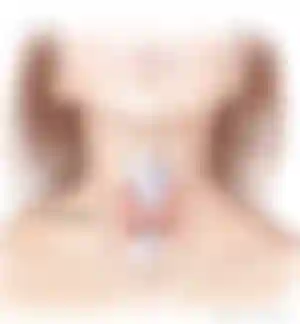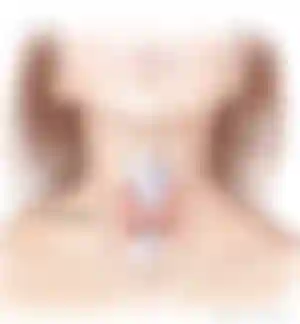Raising Awareness Part 2
The doctor upon seeing me knew at once what my condition was I suppose. She raised from her seat, heading to where I was seated and touched my neck,

commanded me to raise my hand on a shoulder level, and went back to her seat.
The doctor asked me what I went through, what I had experienced, what I had felt, I only answered one to three words and in a monotone. Most of the time my mother answered for me, she’s always been my spokesperson :)
Doc then took a hold of a picture and made a short lecture or information about what my condition was all about. She made first lectured about thyroid gland and its role and function to our body.

Further, Doc talked about hyperthyroidism and hypothyroidism. My first time to hear such words. Upon discussion brought me into awareness that what I had undergone by the time I lose weight was hyperthyroidism and by the time I gained weight was hypothyroidism.
These two seems like magic casting a spell within my body in a glance affecting my overall physical and psychological health.
I had overlooked all the symptoms. For in my case according to the doctor was already late detection.
So I want to raise awareness about hyperthyroidism and hypothyroidism. I want to raise awareness how these disease affects our overall physical, mental and psychological well being. I want to raise awareness how this disease can transform us in a bad or worse way. I want to raise awareness to not overlooked the symptoms instead consult a doctor right away.
This is an excerpt from google.com https://www.niddk.nih.gov/health-information/endocrine-diseases/hyperthyroidism
What is hyperthyroidism?
Hyperthyroidism, also called overactive thyroid, is when the thyroid gland makes more thyroid hormones than your body needs. The thyroid is a small, butterfly-shaped gland in the front of your neck. Thyroid hormones control the way the body uses energy, so they affect nearly every organ in your body, even the way your heart beats. With too much thyroid hormone, many of your body’s functions speed up.
What causes hyperthyroidism?
Hyperthyroidism has several causes, including
· overactive thyroid nodules
· inflammation of the thyroid gland, called thyroiditis
· too much iodine NIH external link
· too much thyroid hormone medicine
What are the symptoms of hyperthyroidism?
Symptoms of hyperthyroidism can vary from person to person and may include4
· weight loss despite an increased appetite
· rapid or irregular heartbeat
· nervousness, irritability, trouble sleeping, fatigue
· shaky hands, muscle weakness
· sweating or trouble tolerating heat
· frequent bowel movements
· an enlargement in the neck, called a goiter
What are the complications of hyperthyroidism?
Untreated, hyperthyroidism can cause serious health problems, including
· an irregular heartbeat that can lead to blood clots, stroke, heart failure, and other heart-related problems
· an eye disease called Graves’ ophthalmopathy
· thinning bones, osteoporosis NIH external link, and muscle problems
· menstrual cycle and fertility issues
Who is more likely to develop hyperthyroidism?
Hyperthyroidism is more common in women and people older than 60.2 You are more likely to have hyperthyroidism if you
· have a family history of thyroid disease
· have other health problems, including
o pernicious anemia NIH external link, a condition caused by a vitamin B12 deficiency
o primary adrenal insufficiency, a disorder of hormones
· eat large amounts of food containing iodine NIH external link, such as kelp
· use medicines that contain iodine
· use nicotine products3
· were pregnant within the past 6 months
How do doctors diagnose hyperthyroidism?
Your doctor will take a medical history and perform a physical exam. A hyperthyroidism diagnosis can’t be based on symptoms alone because many of its symptoms are the same as those of other diseases. That’s why your doctor may use several thyroid blood tests and imaging tests to confirm the diagnosis and find its cause.
Because hyperthyroidism can cause fertility problems, women who have trouble getting pregnant often get tested for thyroid problems
Treatment options
Hyperthyroidism is usually treated with medicines, radioiodine therapy, or thyroid surgery.
What is hypothyroidism?
Hypothyroidism is a condition where there isn’t enough thyroid hormone in your bloodstream and your metabolism slows down.
Hypothyroidism happens when your thyroid doesn’t create and release enough thyroid hormone into your body. This makes your metabolism slow down, affecting your entire body. Also known as underactive thyroid disease, hypothyroidism is fairly common.
When your thyroid levels are extremely low, this is called myxedema. A very serious condition, myxedema can cause serious symptoms, including:
Confusion.
Coma.
What are the symptoms of hypothyroidism?
The symptoms of hypothyroidism usually develop slowly over time – sometimes years. They can include:
Feeling tired (fatigue).
Experiencing numbness and tingling in your hands.
Having constipation.
Gaining weight.
Experiencing soreness throughout your body (can include muscle weakness).
Having higher than normal blood cholesterol levels.
Feeling depressed.
Being unable to tolerate cold temperatures.
Having dry, coarse skin and hair.
Experiencing a decrease sexual interest.
Having frequent and heavy menstrual periods.
Seeing physical changes in your face (including drooping eyelids, as well as puffiness in the eyes and face).
Having your voice become lower and hoarser.
Feeling more forgetful (“brain fog”).
Who is affected by hypothyroidism?
· Hypothyroidism can affect people of all ages, genders and ethnicities. It’s a common condition, particularly among women over age 60. Women are generally more likely to develop hypothyroidism after menopause than earlier in life.
What’s the difference between hypothyroidism and hyperthyroidism?
· In hypothyroidism, the thyroid doesn’t make enough thyroid hormone.
· The difference between hypothyroidism and hyperthyroidism is quantity. In hypothyroidism, the thyroid makes very little thyroid hormone. On the flip side, someone with hyperthyroidism has a thyroid that makes too much thyroid hormone. Hyperthyroidism involves higher levels of thyroid hormones, which makes your metabolism speed up. If you have hypothyroidism, your metabolism slows down.
· Many things are the opposite between these two conditions. If you have hypothyroidism, you may have a difficult time dealing with the cold. If you have hyperthyroidism, you may not handle the heat. They are opposite extremes of thyroid function. Ideally, you should be in the middle. Treatments for both of these conditions work to get your thyroid function as close to that middle ground as possible.
What happens if hypothyroidism is not treated?
Hypothyroidism can become a serious and life-threatening medical condition if you do not get treatment from a healthcare provider. If you are not treated, your symptoms can become more severe and can include:
Having trouble breathing.
Not being able to maintain a normal body temperature.
Having heart problems.
Developing a goiter (enlargement of the thyroid gland).
(medication - to be continued for part 3)


I just heared that kind that of words maam, now we are aware of such, this is so informative article, so that people will be aware of this. Its a worth reading article, I cant wait to read your next artcle